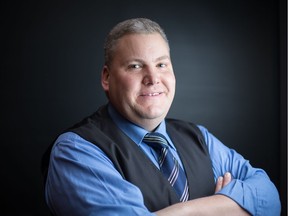Sundberg: A university could improve the way policing is delivered

Article content
By Kelly W. Sundberg
The reputational decline of the Calgary Police Service is clearly a cause for public concern.
Allegations of systemic bullying and sexual harassment, coupled with concerns regarding officer misconduct, excessive use of force, and most recently, remarks made by the director of ASIRT suggesting murky and unprincipled practices are being used when the police investigate their own, all have resulted in the police facing unprecedented public criticism.
Yet, despite this criticism, despite reputational decline, and despite diminishing public support, it is highly commendable that the women and men of the Calgary Police Service continue to selflessly serve and protect our community.
While it’s clear the Calgary Police Service needs to do better, I remain confident that Chief Roger Chaffin is moving in the right direction. Moreover, it’s also clear that the problems facing our police are neither new, nor unique.
Over the past several years, in news reports from across Canada, allegations of bullying and sexual harassment within police ranks, officer misconduct, as well as excessive use of force, unfortunately have become commonplace.
Arguably, these many reports have caused the legitimacy and credibility of the police to diminish. Notwithstanding research that suggests many of these longstanding concerns are the result of legislative and regulatory neglect, it’s apparent that a general lack of understanding, awareness and collaboration between the police, academia, government and the public also are significant contributing factors.
Nevertheless, knowing the challenges is one thing; identifying actionable and sustained solutions is entirely another. We cannot expect the police to find solutions on their own. Nor should we expect answers to come from academe or government alone.
Those of us who study and critique the police should be offering more informed insight and achievable solutions. After all, it’s in everyone’s best interest — the public, government and the police — to work toward a more fair, efficient and economical criminal justice system.
It appears to me that three important questions remain unanswered: who should lead police reform, how will it be paid for, and when will it start?
If left to the police, reforms would likely be met with suspicion and viewed as self-serving. If left to government, reforms would likely be perceived as partisan. Though reports by consultancy firms have identified sound strategies for achieving operational efficiencies, these reports typically come with a hefty price tag and fall short in addressing challenges related to police culture.
So, if not the police, government, or private consultancies, who would be the most effective and objective organization to address police reform?
Why not our public universities?
Universities by their very nature are where knowledge is advanced for the betterment of society. Likewise, the governance structure of universities is designed to balance open and objective discourse with public accountability.
University programs are grounded on scholarly inquiry, and research is adherent to the highest ethical standards, reflective of the most appropriate methodological approaches, and ultimately testable through rigorous peer review.
In short, universities are public institutions expressly mandated and resourced to objectively study and address social issues, including police reform.
Frankly, the coming to light of the many serious concerns facing the Calgary Police Service provides a clear indication that alleged misconduct is not being swept under the rug. Rather, recent reports support the position that Chaffin is being as open, accountable and transparent as possible, given the legislative framework he must operate within.
So, what next? Considering the mounting allegations against the police, and acknowledging there is consensus between the police, legal and academic communities that a new Police Act is urgently needed, I truly believe that Albertans would be best served if the minister of justice and solicitor general gave a public university the mandate and support needed to develop an informed framework for a new Police Act, ultimately advancing and improving the way policing is achieved in our province.
Kelly W. Sundberg is an associate professor in Mount Royal University’s department of economics, justice and policy studies.






Postmedia is committed to maintaining a lively but civil forum for discussion. Please keep comments relevant and respectful. Comments may take up to an hour to appear on the site. You will receive an email if there is a reply to your comment, an update to a thread you follow or if a user you follow comments. Visit our Community Guidelines for more information.